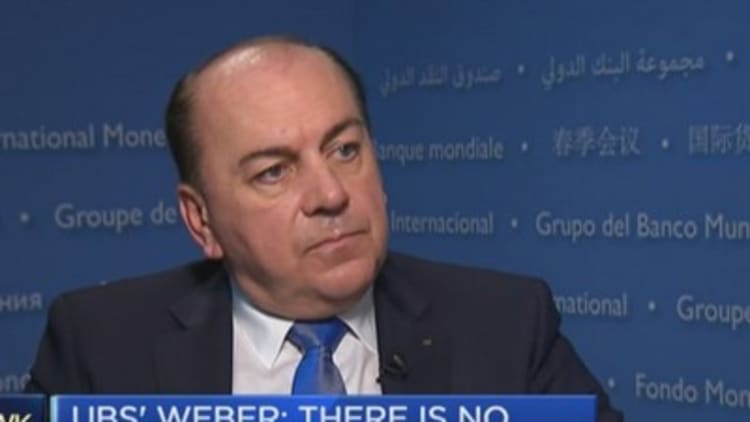
The downsides of ultra-loose monetary policy have returned to focus this month, following comments from the likes of BlackRock's Laurence Fink and European Central Bank (ECB) President Mario Draghi.
Speaking to CNBC over the weekend from the International Monetary Fund's Spring Meeting, Draghi said that the ECB's low interest rates and newly introduced quantitative easing program had hit savers and the funds in which they invested.
Earlier this year, the ECB became the latest major central banks to launch a bond-buying program, in a further bid to boost liquidity in the region. Other major central banks that had already instigated similar asset-purchase programs include the U.S. Federal Reserve, the U.K. Bank of England and the Bank of Japan.
"The pension funds, the insurance companies, they do certainly suffer from low interest rates," Draghi told CNBC from Washington D.C., before adding that other policy courses might also have hit savers.
"Our monetary policy stance has been designed according to our mandate, which is to assure price stability...that's the best service that we can make to the economy and to both consumers and savers. To run a different monetary policy stance would ultimately damage the savers too."
Benchmark interest rates in the euro zone, and other regions like the U.K. and the U.S., are at record lows. These rates set the level for all sorts of home loans and savings accounts. Thus, low interest rates might be good for mortgage holders, but they also mean that savers suffer low yields on their deposits.
Draghi's comments came after Fink, the founder and CEO of BlackRock, told CNBC on Thursday that central banks did not understand the "havoc" or the "huge pain" caused to insurance companies from low interest rates. He added that loose monetary policy across the region was deterring BlackRock's insurance companies in Europe from reinvesting in Germany and Switzerland.
On Monday, David Owen, the chief European economist at Jefferies International, told CNBC that low rates were part of the ECB's policy to generate a "risk culture," in which investors opted for riskier, but potentially higher-yielding assets.
However, regulatory restrictions on what pension funds can invest in meant they sometimes missed a significant rally in a particular asset class, UBS Chairman Axel Weber told CNBC at the IMF meeting over the weekend.
"Investors that are free to invest in asset classes and be globally diversified across all asset classes have actually gained if they had an equity 'overweight' in the past," he said. "Fixed income driven or dominated investors have suffered and it's part of the QE side effects that you always see and I think this will continue."
Read More Soros: ECB QE means inequality and asset bubbles
A report by the Bank of England in 2013 concluded that QE had a broadly "neutral effect" on pension funds, increasing the value of both their assets and liabilities. However, representatives from the U.K.'s National Association of Pension Funds and the campaign group "Save our Savers" have lambasted the policy in recent years.
Weber added that the pensioners and savers behind these institutions were being "crushed" and that pension funds would find it hard to deliver the promised returns if this environment continued. Additionally, he said that lucrative defined benefit pension schemes –which are popular in Europe and pay out an income based on how much you earned on retirement – would be scaled back further if this monetary policy continues.
However, as the euro zone's recovery picks up along with employment, Draghi said that interest rates would naturally rise and favor savers and pension funds once more.


